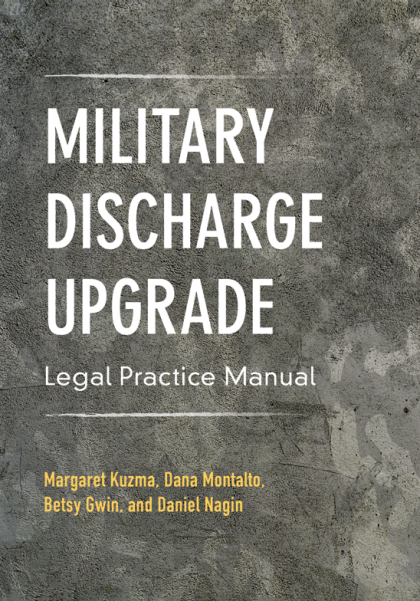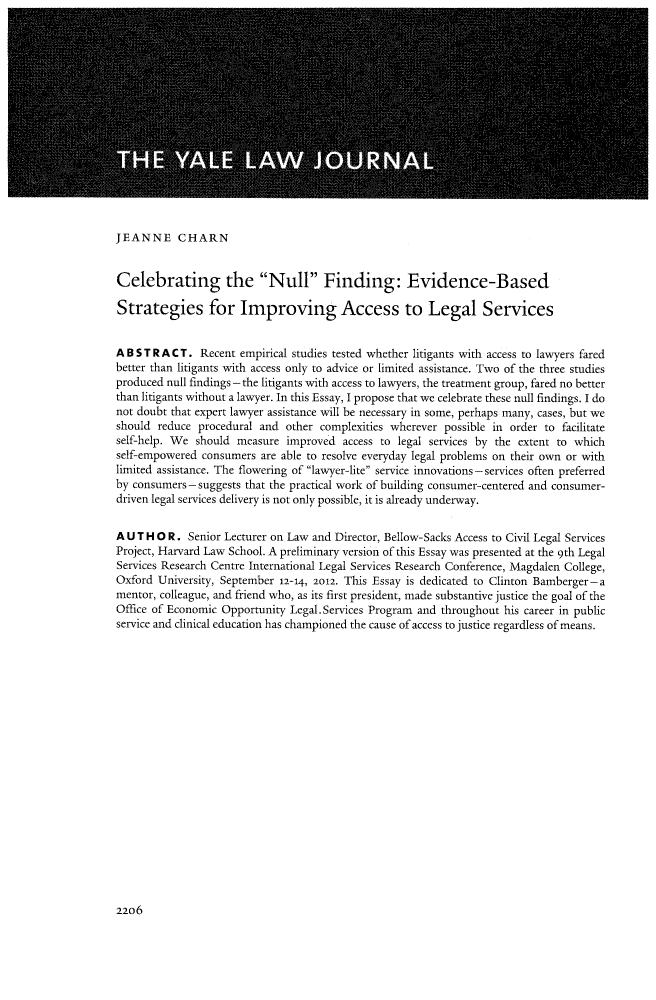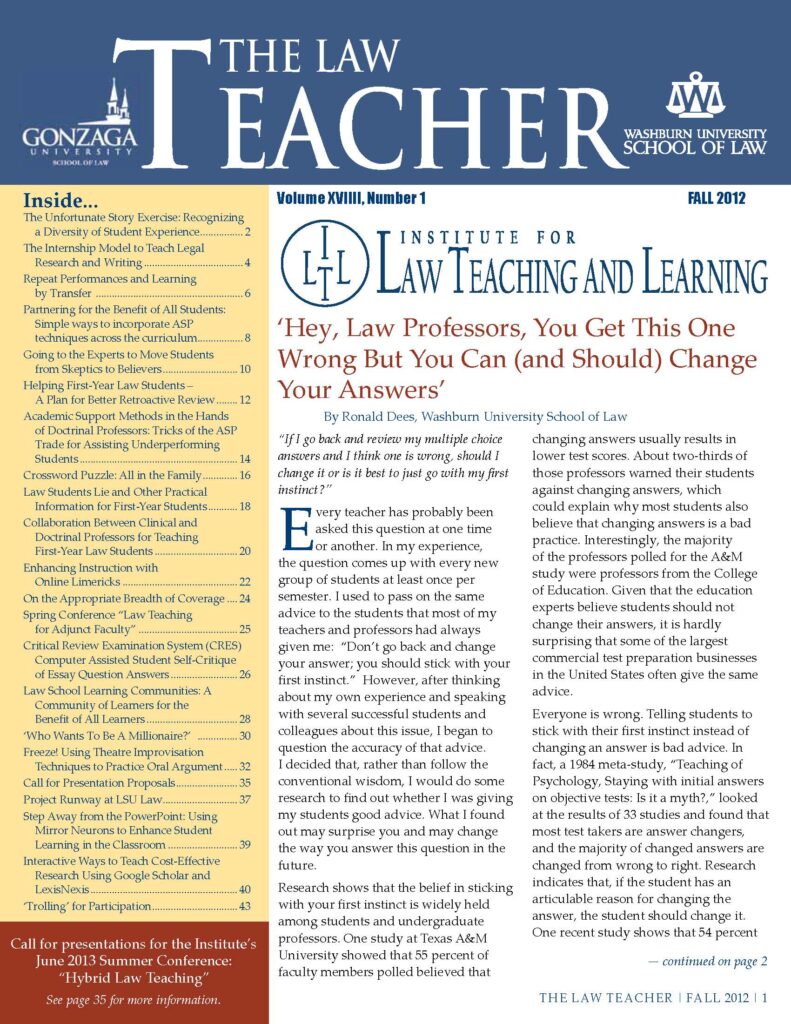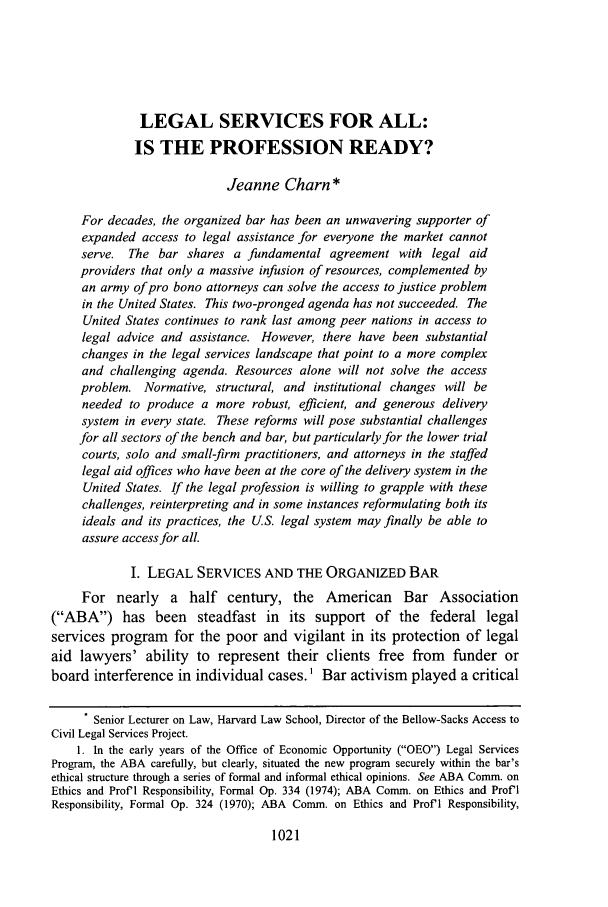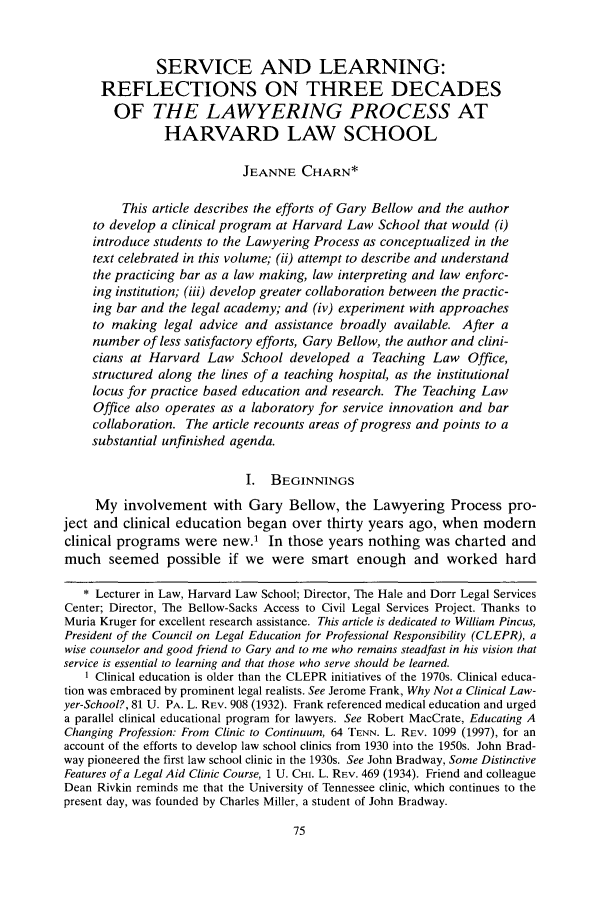In addition to our commitment to teaching and lawyering in the public interest, members of the Legal Services Center (LSC) community frequently publish scholarly work, legal practice guides, reports, and other types of content. In this way, LSC both contributes to and shapes important conversations about law, policy, and justice.
Out of the Closet, In on Bail (forthcoming, 2025)
Author: Deborah Lolai
This Article examines the disproportionate impact of bail practices on the LGBTQ community. This is the first law review article to examine the American pretrial detention system from an LGBTQ perspective. Part I introduces the experiences of LGBTQ defendants in pretrial detention and contextualizes the need for my original research.
Part II provides the findings of my research, a comprehensive survey of bail statutes and laws across 52 jurisdictions (50 states, D.C., and Federal Courts). My analysis identifies key factors that judges commonly consider when setting bail-such as familial relationships and community ties, residence, employment, criminal records, failures to appear, history of substance use, and mental health-that disproportionately disadvantage LGBTQ individuals due to systemic discrimination. The Article examines Layleen Xtravaganza Cubilette-Polanco’s experience as a case study to illustrate the bail factors’ problems in practice.
After presenting the novel data, Part III of the Article offers targeted recommendations for bail reform through an LGBTQ lens, aiming to address these disparities and promote equitable practices. By shedding light on how existing bail frameworks are impacted by and further exacerbate marginalization, this Article seeks to influence the broader bail reform movement and provide judges and other pretrial detention decision-makers with critical insights for making more informed and fair decisions when LGBTQ defendants appear before them.
Published: Forthcoming (2025), Harvard Law School (Harvard Public Law & Legal Theory Research Paper Series)
Citation: 61.1 Harv. C.R. & C.L. L. Rev. (forthcoming 2025)
The Pervasive and Troubling use of Coverage Attorneys in Assembly-Line Litigation (forthcoming).
Author: Alexa Rosenbloom
Citation: Rosenbloom, Alexa, The Pervasive and Troubling use of Coverage Attorneys in Assembly-Line Litigation (August 01, 2025). forthcoming 33 Geo. J. on Poverty L. & Pol’y (2026) EndFragment
Beyond the Criminal Justice System, Using the Law to Help Restore the Lives of Sexual Assault Victims, A Practical Guide for Attorneys and Advocates (forthcoming).
Author: Julia Devanthéry
Citation: Victim Rights Law Center, Beyond the Criminal Justice System, Using the Law to Help Restore the Lives of Sexual Assault Victims, A Practical Guide for Attorneys and Advocates, Housing Rights of Sexual Assault Victims (forthcoming).
Home Safe: The Case for Decoupling Survivor Eviction Protections from the Criminal Legal System (forthcoming).
Author: Julia Devanthéry
Citation: Julia Devanthéry, Home Safe: The Case for Decoupling Survivor Eviction Protections from the Criminal Legal System, New York University Journal of Legislation and Public Policy, Volume 28.3 (forthcoming).

Legal Tactics: Tenants’ Rights In Massachusetts, Massachusetts Law Reform Institute (9th Ed., 2025), Ch. 12 – Evictions
Author: Julia Devanthéry
This chapter tells you how the eviction process works, what rights you have throughout the process, how you can prevent an eviction, and how you might be able to postpone an eviction while you find another place to live.
Citation: Julia Devanthéry, Evictions, Legal Tactics: Tenants’ Rights In Massachusetts, Massachusetts Law Reform Institute (9th Ed., 2025).
Published: 2025, Massachusetts Law Reform Institute

Reasonable Accommodation Issues in Housing, Residential and Commercial Landlord Tenant Practice in Massachusetts, Ch. 3 MCLE 5th Edition
Author: Deena Zakim
Published: 2024, Massachusetts Continuing Legal Education | New England
A Practitioner’s Guide to Innocent Spouse Relief, Third Edition
Authors: Audrey Patten and Christine S. Speidel
From the ABA: “The book takes the reader step-by-step through the innocent spouse claim process, from information gathering, to administrative proceedings, to determination, to trial, and to refund relief…the guide is written to assist attorneys who represent clients in controversies involving Section 6015, which expanded innocent spouse relief for many taxpayers. Since the section was enacted in 1998, its provisions have generated a good deal of tax litigation, and the book draws on that history to provide proven strategies for winning Section 6015 cases, with special emphasis added to issues involving low income taxpayers and those suffering domestic abuse.”
Published: May 2022 (Third Edition), American Bar Association
Revisiting the Ten Deadly Sins Created in the IRS Restructuring and Reform Act, in The IRS Restructuring and Reform Act Twenty-Five Years Later, Vol. 20, No.1
Author: Keith Fogg
Published: 2022, Pittsburgh Tax Review (University of Pittsburgh, School of Law)
The Rooms Where It Happened in The IRS Restructuring and Reform Act Twenty-Five Years Later, Vol. 20, No.1
Author: Keith Fogg
Published: 2022, Pittsburgh Tax Review (University of Pittsburgh, School of Law)
Exclusionary Effects of the IRS Correspondence Audit Process Warrant Further Study
Authors: Keith Fogg and colleagues
Published: 2022, The Tax Law Center (NYU Law)

Excuses, Excuses: Which Ones Will Work
Author: Keith Fogg
In Brockamp, the Supreme Court faced the issue of whether the three-year time limit for filing an administrative tax refund claim in Code Sec. 6511 was subject to equitable tolling.8 Without discussing whether the time period was jurisdictional (and apparently assuming that it was not), the Court held that, even if the Irwin presumption applied to this time period, a combination of factors would rebut any presumption that equitable tolling could apply…
Published: 2022, Harvard Law School
Pro Se Precedent in the U.S. Tax Court: A Case for Amicus Briefs
Authors: Keith Fogg and Caitlin Hird
The United States Tax Court hears well over 90% of the federal tax cases litigated each year with only a small percentage of opinions coming out of district courts and the Court of Federal Claims. The Tax Court classifies its opinions as precedential or non-precedential based on the issues presented. Over 75% of Tax Court litigants file their petition pro se. Each year it classifies a handful of opinions as precedential in which the petitioner(s) is pro se. In almost all of these cases the Court creates binding precedent on the basis of a case in which only one side, the IRS, presents meaningful legal arguments thus turning the process leading to the decision from one based on the adversarial process to the inquisitorial process. While the Tax Court works hard to reach the right conclusion, it loses the benefit of legal argument on the side of the petitioner/taxpayer and potentially reaches a different conclusion than it might have reached had the taxpayer’s side of the argument been well developed.
Published: 2022, Houston Business and Tax Law Journal
Reducing Administrative Burdens to Protect Taxpayer Rights
Authors: Keith Fogg and colleagues
Published: 2022, Oklahoma Law Review (University of Oklahoma)

Housing Rights in Legal Rights of Individuals with Disabilities, Ch. 2 MCLE 3rd Edition
Author: Deena Zakim
Published: 2021, Massachusetts Continuing Legal Education | New England

The Role of Offset in the Collection of Federal Taxes
Author: Keith Fogg
The legal principle of offset has played a key role in debt collection by private parties for centuries. In 2021, offset continues to play an equally essential role in the United States government’s collection of debts owed to it, accounting for billions of dollars in funds taken from outgoing payments.
Published: 2021, Florida Tax Review (University of Florida)

Securing Relief From Joint and Several Liability – Section 6015 in Effectively Representing Your Client Before the IRS
Authors: Audrey Patten & Megan L. Brackney
Published: 2021, American Bar Association
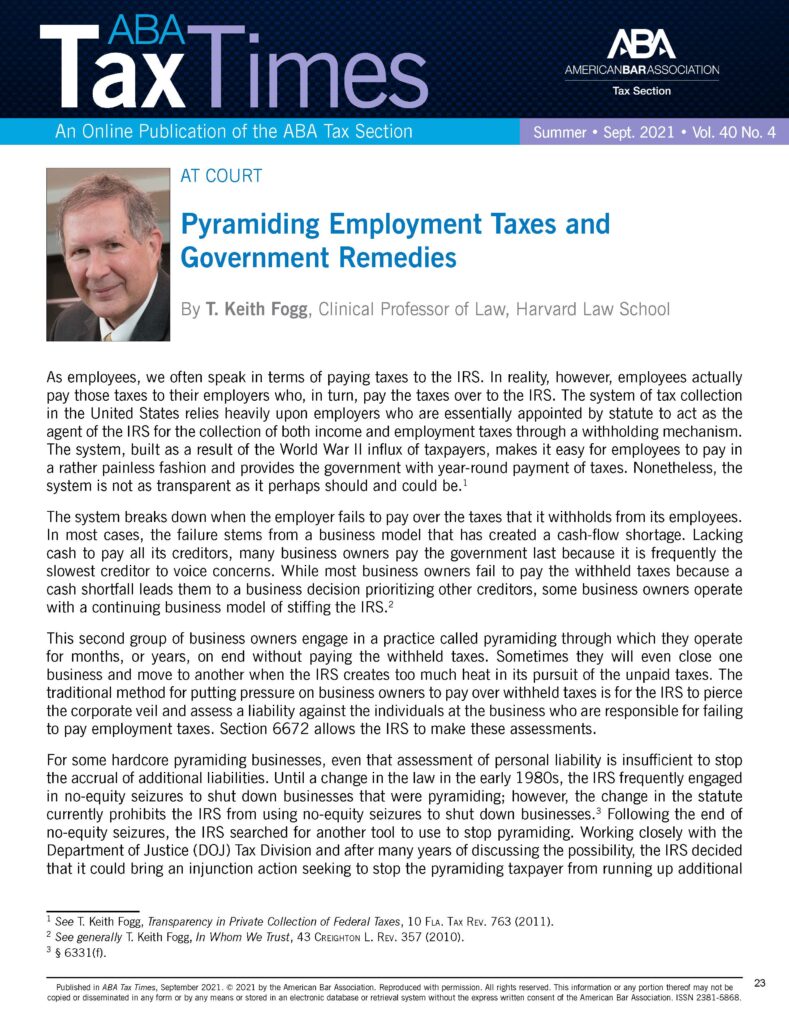
Pyramiding Employment Taxes and Government Remedies at Court
Author: Keith Fogg
As employees, we often speak in terms of paying taxes to the IRS. In reality, however, employees actually pay those taxes to their employers who, in turn, pay the taxes over to the IRS. The system of tax collection in the United States relies heavily upon employers who are essentially appointed by statute to act as the agent of the IRS for the collection of both income and employment taxes through a withholding mechanism. The system, built as a result of the World War II influx of taxpayers, makes it easy for employees to pay in a rather painless fashion and provides the government with year-round payment of taxes. Nonetheless, the system is not as transparent as it perhaps should and could be.
Published: 2021, American Bar Association (ABA Tax Times)
Military Discharge Upgrade Legal Practice Manual
Authors: Veterans Legal Clinic at the Legal Services Center of Harvard Law School and the Connecticut Veterans Legal Center
The Military Discharge Upgrade Legal Practice Manual—edited by attorneys from the Legal Services Center of Harvard Law School’s Veterans Legal Clinic and with chapter contributions by expert attorneys from across the country—is a comprehensive guide to representing veterans with less-than-honorable or otherwise stigmatizing discharges before military review boards. This landmark publication—the first of its kind in 30 years—serves as a desktop reference for anyone interested in advocating for veterans, restoring honor to those who have served, and opening doors to life-altering support. This landmark publication—the first of its kind in 30 years—serves as a desktop reference for anyone interested in advocating for veterans, restoring honor to those who have served, and opening doors to life-altering support. Learn more.
Published: 2021, ABA Book Publishing
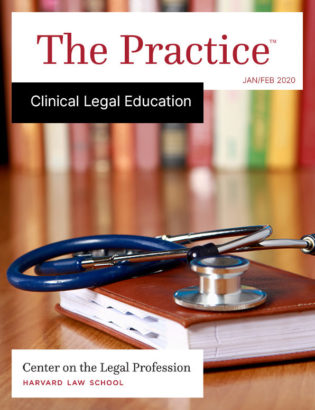
On Clinical Legal Education, Practice (Special Issue)
Author: Daniel Nagin
Published: 2020, Harvard Law School (Center on Legal Profession)
Authors: Julia Devanthéry, Dan Daley, and Lisabeth Jorgensen
BHA v. Y.A. will have far-reaching implications for victims of domestic violence across Massachusetts and, perhaps, nationally. The holding affirms many core principles that will protect victims and their families from eviction and homelessness.
Citation: Julia Devanthéry, Dan Daley, and Lisabeth Jorgensen, Boston Housing Authority v. Y.A., 482 Mass. 240 (2019): SJC Clarifies VAWA Defenses in Eviction Cases, Boston Bar Journal, Winter 2020 Vol. 64 #1.
Published: 2020, Boston Bar Association (Case Focus)
Access to Judicial Review in Non-Deficiency Tax Cases
Author: Keith Fogg
Published: 2020, American Bar Association
Tax Court Making Significant Changes During Pandemic
Author: Keith Fogg
As it approaches its 100th birthday in just a few more years, the Tax Court is undergoing one of its most significant changes since its creation, in large part due to the pandemic’s impact. Born as a national court, the Tax Court long met its mission of nationwide coverage by having judges travel to all corners of the United States. The press release and the videos provide the roadmap for practitioners (and for the 70% of Tax Court petitioners who are pro se) seeking to prepare for an encounter with the new Tax Court.
Published: 2020, American Bar Association (ABA Tax Times)
Turned Away: How VA Unlawfully Denies Health Care to Veterans with Bad Paper
Authors: Veterans Legal Clinic at the Legal Services Center of Harvard Law School, Veterans Legal Services, and Wilmer, Cutler, Pickering, Hale and Dorr LLP on behalf of OUTVETS.
More than 400,000 veterans currently at risk of being unlawfully turned away from treatment for service-related mental health conditions and other disabilities without due process
Published: March 2020, Veterans Legal Clinic at the Legal Services Center of Harvard Law School on behalf of OUTVETS, a national LGBT veterans community organization.

‘This Place is Slowly Killing Me:’ Abuse and Neglect in Orange County Emergency Shelters
Author: Julia Devanthéry and Eve Garrow
“‘This Place is Slowly Killing Me:’ Abuse and Neglect in Orange County Emergency Shelters,” compiled through first-person visits and more than 70 interviews with residents, staff members, and shelter volunteers at three facilities — the Courtyard Transitional Center and SAFEPlace in Santa Ana, and Bridges at Kraemer Place in Anaheim.
Citation: Eve Garrow and Julia Devanthéry, ‘This Place Is Slowly Killing Me:’ Abuse and Neglect in Orange County Emergency Shelters, ACLU of Southern California, March 2019.
Published: 2019, ACLU Foundation of Southern California (ACLU SoCal)
Early Lease Termination Under G.L. c. 186, § 24: An Essential Escape Route for Tenants Who Are Facing Domestic Violence, Sexual Assault, or Stalking
Author: Julia Devanthéry
Survivors of sexual assault, domestic violence, or stalking often have to leave their homes and relocate to a safer place with little notice or planning in order to avoid harm by a perpetrator who knows where they live.
Citation: Julia Devanthéry, Early Lease Termination Under M.G.L. c. 186, § 24: An Essential Escape Route for Tenants Facing Domestic Violence, Sexual Assault or Stalking, Boston Bar Journal, Summer 2017 Vol. 61 #13.
Published: August 9 2017, Boston Bar Association (Legal Analysis)
The Supreme Judicial Court’s Decision in Beacon Residential v. R.P. Gives Survivors of Domestic Violence Their Day in Housing Court
Author: Julia Devanthéry
The link between domestic abuse and housing instability is undeniable; survivors often face housing loss as a direct result of abuse or find themselves homeless after fleeing violence. In an all-too-common scenario, a survivor lives with her abuser, but is not on the lease because the abuser intentionally withholds housing stability as a method of abuse. In those cases, survivors may have to choose between their safety and their housing if they decide to separate from their abusers. Now, however, under the Supreme Judicial Court’s (“SJC”) recent decision in Beacon Residential v. R.P., survivors of domestic violence—including those who aren’t on the lease and are alleged to be “unauthorized occupants” by the landlord—are allowed to intervene as of right in summary process cases under Mass. R. Civ. P. 24 (a)(2) if they claim an interest relating to the apartment subject to the eviction proceedings. Beacon Residential Management, LP v. R.P., SJC-12265, slip op. (Sept. 14, 2017). As a result, thousands of survivors across the Commonwealth, formerly excluded from summary process cases, will have a right to their day in Housing Court.
Citation: Julia Devanthéry, The Supreme Judicial Court’s Decision in Beacon Residential v. R.P. Gives Survivors of Domestic Violence Their Day in Housing Court, Boston Bar Journal, Fall 2017 Vol. 61 #4.
Published: 2017, Boston Bar Association (Case Focus)
Legal tactics : tenants’ rights in Massachusetts in private housing, 8th Edition
Authors: Maureen McDonagh & Julia Devanthéry
From Mass Legal Help: Provides practical information about tenants’ rights in private housing—housing that is owned by an individual or a privately-owned company.
Published: 2017 (8th Edition), Massachusetts Law Reform Institute
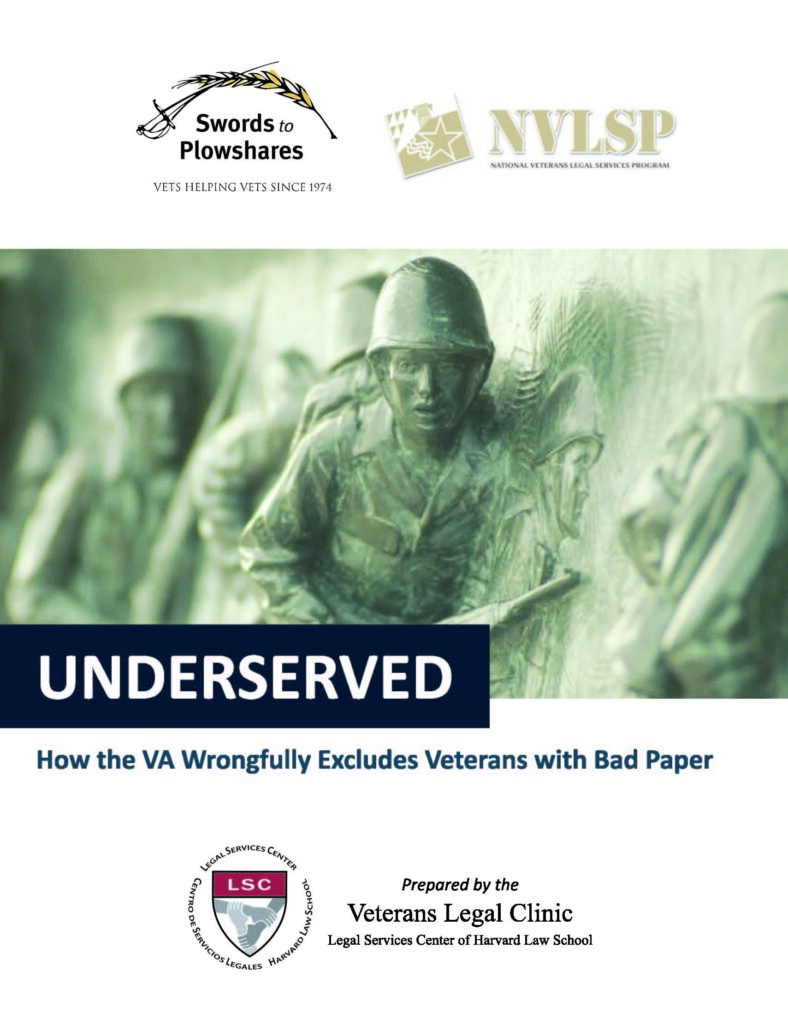
Underserved: How the VA Wrongfully Excludes Veterans with Bad Paper
Author: Veterans Legal Clinic at the Legal Services Center of Harvard Law School
Swords to Plowshares, in conjunction with National Veterans Legal Services Program and the Veterans Legal Clinic at the Legal Services Center of Harvard Law School have published Underserved: How the VA Wrongfully Excludes Veterans with Bad Paper.
Published: 2016, Swords to Plowshares & National Veterans Legal Services Program (NVLSP)
The Credibility Trap: Notes on a VA Evidentiary Standard
Authors: Daniel Nagin
The system we currently use to deliver disability compensation to injured veterans is deeply flawed. This system-the service-connected disability compensation program administered today by the U.S. Department of Veterans Affairs (“VA”) -was designed and built for a different era. But the system’s original framework persists, with enormous negative consequences.
Published: 2015, The University of Memphis Law Review
Goals vs. Deadlines: Notes on the VA Disability Claims Backlog
Authors: Daniel Nagin
Drawing primarily on policy considerations, social science research, and the relevant statutory and doctrinal frameworks within veterans benefits law, this article argues that Congress should subject the U.S. Department of Veterans Affairs (VA) to a clear and enforceable deadline for making initial eligibility determinations on claims for service-connected compensation. Despite widespread media coverage of delays in VA’s adjudication system and countless oversight hearings and congressional proposals for reform, this simple idea – to impose a hard deadline upon VA has either been overlooked entirely or drowned out by a preoccupation with other types of legislative responses to the VA claims backlog. This article seeks to enter the debate about remedying the backlog from a slightly different vantage point than the perspectives used to date, one that focuses on the nature of deadlines – including the psychology of deadlines, the enforcement of deadlines, and the role deadlines might play in promoting perceptions of agency fairness and legitimacy. Along the way, the article draws on VA’s own data to reveal the long-standing gap between the agency’s timeliness goals and its performance. The reform proposed here is admittedly modest in many respects; it is far from a cure all for delay. But it does reflect certain fundamental values that should animate any reforms to the VA system: expanding enforcement tools, applying lessons learned from past VA failures, and treating veterans with dignity.
Published: 2015, University of Massachusetts School of Law
“You’re Going To Be Straight or You’re Not Going To Live Here”: Child Support for LGBT Homeless Youth
Author: Deborah Lolai
At a time when hundreds of thousands of LGBT youth are homeless across the country, LGBT homeless youth are in desperate need of competent assistance from attorneys. In an effort to fulfill this dire need, this Article highlights a groundbreaking approach to securing housing and health for these young people. By drawing extensively on New York case law, this Article outlines the previously unutilized approach that attorneys can take in representing homeless LGBT youth: assisting them in petitioning their parent(s) for child support. Unemancipated minors are eligible for child support, and this Article proves how homeless LGBT youth could be deemed unemancipated. By extensively focusing on the causes of LGBT youth homelessness, the extreme risks these youth face on the streets, and the tremendous burdens that would be lifted if they received child support, this Article offers a great tool for attorneys who wish to help improve the
lives of homeless LGBT young people and ensure that they no longer have to struggle to survive on the streets.
Published: 2015, Tulane Journal of Law and Sexuality (Tulane University School of Law)
Celebrating the Null Finding: Evidence-Based Strategies for Improving Access to Legal Services
Author: Jeanne Charn
Recent empirical studies tested whether litigants with access to lawyers fared better than litigants with access only to advice or limited assistance. Two of the three studies produced null findings—the litigants with access to lawyers, the treatment group, fared no better than litigants without a lawyer. In this Essay, I propose that we celebrate these null findings. I do not doubt that expert lawyer assistance will be necessary in some, perhaps many, cases, but we should reduce procedural and other complexities wherever possible in order to facilitate self-help. We should measure improved access to legal services by the extent to which self-empowered consumers are able to resolve everyday legal problems on their own or with limited assistance. The flowering of “lawyer-lite” service innovations—services often preferred by consumers—suggests that the practical work of building consumer-centered and consumerdriven legal services delivery is not only possible, it is already underway
Published: 2012-2013, Yale Law Journal
Repeat Performances and Learning by Transfer
Author: Daniel Nagin
Each time we teach a particular course, or a specific topic within a course, we get better at it. Each time we present the same paper at a workshop or conference, we get better at presenting that paper. (Or at least, these are our hopes.)
Published: Fall 2012, Institute for Law Teaching and Learning
Taking Care of its Own: Comparing the United States Military’s Transitional Compensation Program with State Victim Compensation Programs
Author: Margaret Kuzma
The U.S. Army prides itself on its commitment to “take care of its own.” This ethos signifies that service members and their families all comprise a larger “Army Family,” in which members protect one another. Accordingly, a service member’s family is as much a part of the “Military Family” as the service member. But how does this ethical standard endure when the service member is committing acts of domestic violence against his family? In 1994, part of the National Defense Authorization Act implemented a program through which the military continues to pay a former service member’s dependents if he is discharged from the military for domestic abuse. How does this compensation program measure up to states’ efforts to compensate victims of crimes? By detailing the specifics of the military’s Transitional Compensation program and by taking a broad look at state victim compensation programs, this article sets out to investigate who takes better care of whom, and whether the two systems can learn from each other.
Published: 2011, ResearchGate
Legal Services for All: Is the Profession Ready
Author: Jeanne Charn
For decades, the organized bar has been an unwavering supporter of expanded access to legal assistance for everyone the market cannot serve. The bar shares a fundamental agreement with legal aid providers that only a massive infusion of resources, complemented by an army of pro bono attorneys can solve the access to justice problem in the United States. This two-pronged approach has not succeeded. The United States Continues to rank last among peer nations in access to legal advice and assistance. However, there have been substantial changes in the legal services landscape that point to a more complex and challenging agenda, Resources alone will not solve the access problem. Normative, structural, and institutional changes willbe needed to produce a more robust, efficient and generous delivery system in every state
Published: 2008-2009, Loyola of Los Angeles Law Review, HeinOnline
Service and Learning: Reflections on Three Decades of the Lawyering Process at Harvard Law School
Authors: Jeanne Charn, Gary Bellow
This article describes the efforts of Gary Bellow and the author [Jeanne Charn] to develop a clinical program at Harvard Law School that would (i) introduce students to the Lawyering Process as conceptualized in the text celebrated in this volume; (ii) attempt to describe and understand the practicing bar as a law making, law interpreting and law enforcing instituion; (iii) develop greater collaboration between the practicing bar and the legal academy; and (iv) experiment with approaches to making legal advice and assistance broadly available.
Published: 2003-2004, Clinical Law Review, HeinOnline
Law Stories
Authors: Gary Bellow, Martha Minow
From Google Books: “War stories” is the phrase used by academic lawyers to disparage the ways practicing lawyers talk about their experiences. Gary Bellow and Martha Minow in Law Stories have gathered a group of stories that explore the actual experiences of clients and lawyers in concrete legal contexts.
The essays in Law Stories are all first-person accounts of law problems and the way they were handled, written by lawyers involved in the problems. They offer the voice and insight of the self-reflective practitioner. As such they provide us with a dimension missing from many third-person accounts of cases, a layer of emotion and perspective on legal institutions experienced by people caught or working within them.
Published: 1998, University of Michigan Press
The Lawyering Process: Materials for Clinical Instruction in Advocacy
Authors: Gary Bellow & Bea Moulton
Published: 1978, Foundation Press


